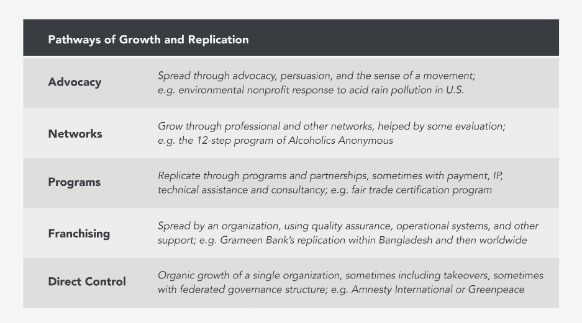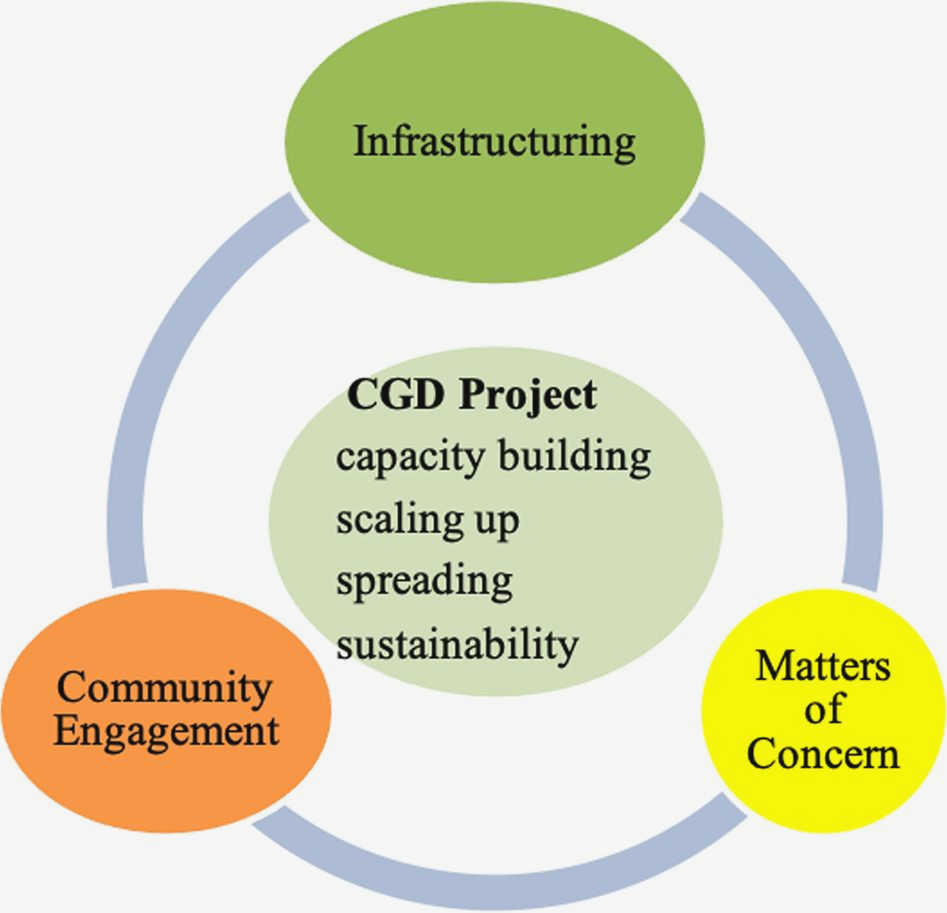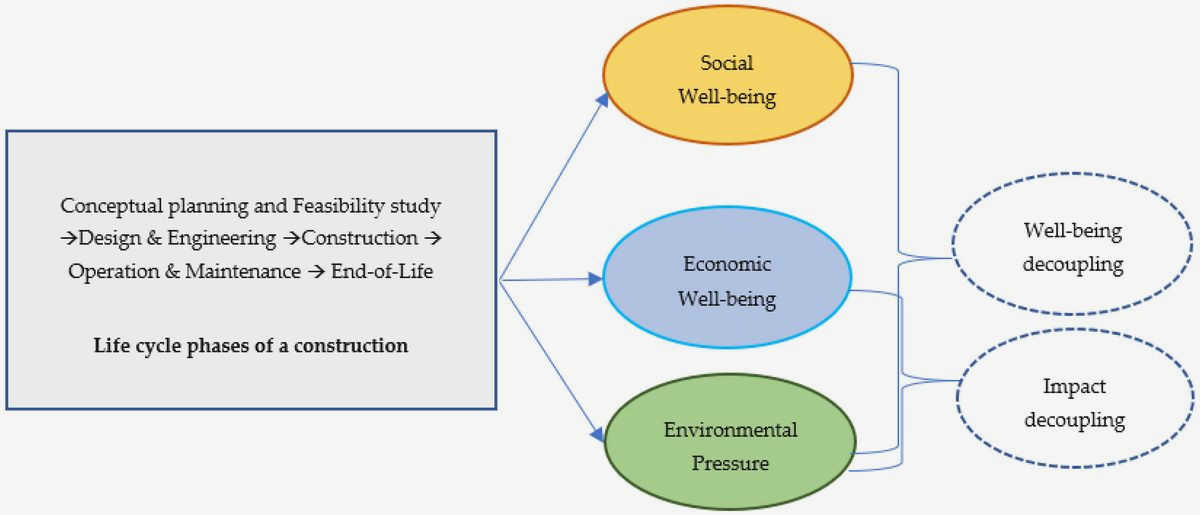In today’s complex world, civil society organizations play a critical role in driving social change and addressing some of the most pressing issues facing our communities. However, in order to effectively scale their impactful programs, these organizations need to build a strong foundation through rigorous evaluation.
Evaluation serves as a crucial tool in assessing the success and effectiveness of civil society programs. It helps organizations understand the outcomes and impacts of their programs, identify what is working and what needs improvement, and make informed decisions based on evidence. By utilizing evaluation, civil society organizations can ensure that their programs are not only making a difference, but also achieving sustainable and long-lasting impact.

Rigorous evaluation techniques, such as randomized controlled trials and quasi-experimental designs, provide robust evidence on the impact of civil society programs. They allow organizations to measure the outcomes of their interventions, compare them to control groups, and determine causal relationships. This evidence-based approach not only enhances the credibility of the organization’s work, but also provides valuable insights for funders, policymakers, and other stakeholders.
Furthermore, evaluation plays a crucial role in scaling impactful programs. It helps organizations understand the key drivers of success, identify best practices, and develop strategies for replication and expansion. By systematically evaluating their programs, civil society organizations can not only improve the quality and effectiveness of their interventions, but also enhance their capacity to reach more beneficiaries and address larger societal challenges.
Understanding the Importance
Understanding the importance of evaluation in scaling impactful civil society programs is crucial for organizations and stakeholders involved in the development and implementation of these programs. Evaluation plays a vital role in assessing the effectiveness and efficiency of programs, identifying areas for improvement, and providing evidence of impact.
Through evaluation, organizations can gather data and evidence that can help them make informed decisions about their programs, ensuring that resources are allocated effectively and efficiently. It enables organizations to measure the extent to which their programs are achieving their goals and objectives, and to identify any gaps in implementation.
Furthermore, evaluation helps build accountability and transparency within civil society programs by providing stakeholders with a clear understanding of the outcomes and impact of these programs. It allows organizations to demonstrate the value and effectiveness of their work, which can help secure funding and support from donors and partners.
Additionally, evaluation provides an opportunity for learning and knowledge sharing within the civil society sector. By evaluating programs, organizations can identify best practices and lessons learned, which can be shared with other organizations and stakeholders to improve program design and implementation.
Overall, understanding the importance of evaluation in scaling impactful civil society programs is essential for ensuring their success and sustainability. It empowers organizations to make evidence-based decisions, improve program effectiveness, and showcase the value of their work to stakeholders and partners.
Significance of Evaluation
Evaluation is a crucial component in the process of scaling impactful civil society programs. It provides a systematic way to assess the effectiveness, efficiency, and sustainability of these programs, helping organizations make informed decisions about how to best allocate resources and achieve their desired outcomes.
One of the key reasons why evaluation is significant is that it helps organizations measure and demonstrate the impact of their programs. By collecting and analyzing data, evaluation enables organizations to assess whether their programs are making a measurable difference in the lives of the people they serve. This information can be used to highlight success stories and attract additional funding and support.
Moreover, evaluation plays a vital role in enhancing program effectiveness. Through evaluation, organizations can identify strengths and weaknesses in their programs, understand what works and what doesn’t, and make necessary adjustments to improve program delivery and outcomes. It allows for continuous learning and adaptation, ensuring that programs remain relevant and responsive to the evolving needs of the communities they serve.
Another significance of evaluation lies in its ability to promote accountability and transparency. By evaluating programs and sharing the results with stakeholders, organizations demonstrate their commitment to transparency in how they use resources and the impact they are achieving. This fosters trust and credibility, which are essential for sustaining support from donors, partners, and beneficiaries.
Finally, evaluation is crucial for knowledge generation and sharing. By documenting and sharing learnings from evaluation processes, organizations contribute to the wider sector’s knowledge base and enable others to learn from their experiences. This sharing of best practices and lessons learned helps to build a stronger civil society sector as a whole and accelerates the scaling of impactful programs across different contexts.
Impact of Evaluation on Civil Society Programs
1. Validating Program Effectiveness:
Evaluation plays a crucial role in assessing the effectiveness of civil society programs. Through rigorous evaluation processes, organizations are able to gather data and evidence on the impact of their programs. This information can help validate the effectiveness of these programs and provide insights into areas for improvement.
2. Ensuring Accountability:
Evaluation helps to ensure accountability within civil society programs. By evaluating the implementation and outcomes of these programs, organizations can demonstrate their commitment to transparency and responsible use of resources. Evaluation findings can also inform decision-making processes and help organizations allocate their resources more effectively.

3. Enhancing Learning and Adaptation:
Evaluation promotes learning and adaptation in civil society programs. Through evaluation, organizations can identify what works and what doesn’t, allowing them to make informed decisions about program design and implementation. Evaluation findings can also provide valuable insights to stakeholders, enabling them to learn from past experiences and improve future initiatives.
4. Informing Scaling Strategies:
Evaluation plays a crucial role in informing the scaling strategies of civil society programs. By evaluating the impact and effectiveness of a program, organizations can gather evidence to support the expansion and replication of successful initiatives. Evaluation findings can help justify investments and attract resources that are essential for scaling up impactful programs.
5. Building Trust and Collaboration:
Evaluation contributes to building trust and collaboration in civil society programs. By involving stakeholders in the evaluation process, organizations can foster transparency, open communication, and shared learning. Evaluation findings can be used to engage partners, donors, and other stakeholders in ongoing discussions and collaborations, strengthening relationships and collective efforts.
In summary, evaluation plays a crucial role in civil society programs by validating program effectiveness, ensuring accountability, enhancing learning and adaptation, informing scaling strategies, and building trust and collaboration. Through rigorous evaluation processes, organizations can gather the evidence needed to drive positive change and scale impactful programs for the benefit of communities and society as a whole.
Establishing Evaluation Framework
Establishing a comprehensive evaluation framework is essential for understanding the impact and effectiveness of civil society programs. This framework provides a structured approach to assess the outcomes, processes, and overall success of a program.
Evaluating program objectives: The evaluation framework should begin by clearly defining the objectives of the program. This includes identifying the desired outcomes and impact, as well as the target beneficiaries. A well-defined objective allows for a focused evaluation that measures the extent to which the program has achieved its goals.
Defining evaluation indicators: Once the program objectives are established, it is important to define specific evaluation indicators that will be used to measure progress and success. These indicators should be measurable, relevant, and aligned with the program goals. Common evaluation indicators include changes in knowledge, attitudes, behavior, and overall program impact.
Collecting and analyzing data: Gathering data is a critical component of the evaluation framework. This can be done through various methods such as surveys, interviews, observations, and document reviews. The collected data should then be analyzed to identify trends, patterns, and areas for improvement. Data analysis requires careful attention to ensure accuracy and reliability of the findings.
Communicating evaluation results: The findings from the evaluation should be communicated effectively to stakeholders, including program staff, beneficiaries, and donors. This helps to ensure transparency and accountability, and provides opportunities for learning and improvement. Clear and concise reporting can facilitate decision-making and enhance the credibility of the program.
Using evaluation findings: Finally, the evaluation framework should emphasize the importance of using evaluation findings to inform program design and implementation. Evaluation results can identify areas of success and areas that require improvement, allowing for evidence-based decision-making. By using the insights gained from evaluation, programs can optimize their impact and scale their initiatives effectively.
In summary, establishing an evaluation framework is a fundamental step in effectively scaling impactful civil society programs. It provides a systematic approach to assessing program outcomes, defining evaluation indicators, collecting and analyzing data, communicating results, and using evaluation findings to inform program improvement. By implementing a comprehensive evaluation framework, organizations can enhance their ability to create meaningful and sustainable social change.
Key Components of Evaluation Framework
1. Clear objectives
The first key component of an evaluation framework is to have clear objectives. These objectives outline the specific goals and desired outcomes of the program being evaluated. By clearly stating the objectives, evaluation can be focused and targeted, ensuring that the right data is collected and analyzed.
2. Measurable indicators
Measurable indicators are essential in evaluating the impact of a civil society program. These indicators are the criteria against which progress and success are measured. They provide quantitative and qualitative data that can be analyzed to assess the effectiveness of the program and determine its impact on the target population.
3. Data collection methods
Data collection methods are crucial for gathering the necessary information to evaluate the program. These methods can include surveys, interviews, focus groups, observations, and document analysis. By using a combination of data collection methods, evaluators can gather a comprehensive set of data that provides a holistic view of the program’s impact.
4. Data analysis techniques
Data analysis techniques are used to make sense of the collected data and draw meaningful conclusions. These techniques can include statistical analysis, qualitative analysis, and data visualization. By analyzing the data, evaluators can identify patterns, trends, and insights that help determine the program’s effectiveness and inform decision-making.
5. Stakeholder engagement
Engaging stakeholders is an essential component of the evaluation framework. Stakeholders, including program beneficiaries, staff, and funders, have valuable insights and perspectives that can contribute to the evaluation process. By involving stakeholders in the evaluation, their input can be considered, ensuring that the evaluation is comprehensive and inclusive.
6. Reporting and dissemination
Reporting and dissemination of evaluation findings are important for sharing information and knowledge. Evaluators should produce clear and concise reports that present the findings in a way that is understandable and accessible to different audiences. Dissemination can be done through various means, such as presentations, publications, and online platforms, to ensure that the evaluation findings reach the intended audience and can be used to inform future decision-making.
Designing a Robust Evaluation Framework
A robust evaluation framework is a critical component of scaling impactful civil society programs. It provides a systematic approach to measuring the effectiveness and impact of these programs, allowing organizations to make informed decisions and drive continuous improvement.
Key Elements of a Robust Evaluation Framework:
- Clear Objectives: The evaluation framework should clearly define the objectives of the program, including the desired outcomes and impact. This provides a foundation for designing evaluation methods and selecting appropriate indicators.
- Multiple Data Sources: To ensure the reliability and validity of the evaluation findings, a robust framework incorporates multiple data sources. This may include qualitative data through interviews and focus groups, as well as quantitative data from surveys and program records.
- Strong Methodology: A robust evaluation framework employs rigorous research methodologies to ensure the accuracy and objectivity of the evaluation process. This may include randomized control trials, quasi-experimental designs, and other methodologies that provide a strong evidence base.
- Use of Key Performance Indicators: The framework should include a set of key performance indicators (KPIs) that align with the program’s objectives. These indicators provide measurable benchmarks to track progress and assess the program’s impact over time.
- Engagement of Stakeholders: Effective evaluation frameworks engage relevant stakeholders throughout the process. This includes program staff, beneficiaries, donors, and other key stakeholders who can provide insights and feedback on the program’s design, implementation, and impact.
- Continuous Monitoring and Evaluation: A robust evaluation framework incorporates ongoing monitoring and evaluation activities to track progress and identify areas for improvement. This allows organizations to make real-time adjustments to their programs and ensure that they are meeting their intended goals and outcomes.
By designing a robust evaluation framework, civil society organizations can effectively assess the impact and effectiveness of their programs, promote learning and accountability, and ultimately scale their impact to create lasting change.
Evaluating Program Effectiveness
Evaluating the effectiveness of a program is crucial to determine its impact and ensure that it is meeting its intended goals and objectives. Effective evaluation allows organizations to assess what works and what does not, allowing them to make informed decisions about program improvement and resource allocation.
There are several key steps involved in evaluating program effectiveness. First, it is important to establish clear objectives and outcomes for the program. This provides a framework for evaluation and helps to identify the key indicators that will be used to measure success.

Next, data collection methods need to be determined. This may involve surveys, interviews, or the collection of quantitative data such as program attendance or participant outcomes. It is important to collect data from a variety of sources to ensure accuracy and reliability.
Once data is collected, it needs to be analyzed and interpreted. This involves identifying patterns, trends, and correlations in the data to determine the program’s effectiveness in achieving its desired outcomes. This can be done through statistical analysis or qualitative analysis methods such as content analysis or thematic coding.

Finally, the results of the evaluation need to be communicated and used to inform decision-making. This may involve sharing findings with program staff, board members, or other stakeholders, and using the results to make adjustments to the program based on the insights gained.
Evaluating program effectiveness is an ongoing process, and it is important to continuously monitor and evaluate program impact to ensure that it remains effective and responsive to the needs of those it serves. By regularly evaluating program effectiveness, organizations can identify areas for improvement and make evidence-based decisions to scale impactful civil society programs.
Measuring Success and Impact
Measuring the success and impact of civil society programs is crucial for understanding their effectiveness and ensuring they are making a real difference in the lives of the communities they serve.
One key aspect of measuring success and impact is the establishment of clear and specific goals and objectives. By defining what the program aims to achieve, it becomes easier to track progress and assess whether or not the desired outcomes have been met. This allows program managers to make data-driven decisions and adjustments to ensure the program’s continued success.
Another important element of measuring success and impact is the collection and analysis of relevant data. This can include quantitative data, such as the number of program participants, changes in key indicators, or the amount of funding raised. It can also include qualitative data, such as testimonials or personal stories from program beneficiaries. By gathering and analyzing this data, program managers can gain a comprehensive understanding of the program’s impact and effectiveness.
Monitoring and evaluation play a vital role in measuring success and impact. Regular monitoring allows program managers to track progress in real-time and make timely adjustments when necessary. Evaluation, on the other hand, provides a more in-depth analysis of the program’s performance and impact. This can include conducting surveys, interviews, or focus groups with program participants and stakeholders to gather feedback and insights.
In addition to monitoring and evaluation, benchmarking can also be used to measure success and impact. By comparing the program’s performance and outcomes to similar programs or best practices, program managers can identify areas for improvement and learn from successful models. This can help inform future program design and implementation and contribute to scaling up impactful civil society programs.
Identifying Outcomes and Indicators
When evaluating the impact of civil society programs, it is crucial to identify the outcomes that the program aims to achieve and the indicators that will be used to measure these outcomes. By clearly defining the desired outcomes, program evaluators can assess whether the program is effectively achieving its goals.
Outcomes refer to the long-term changes or benefits that the program intends to bring about. These outcomes should be specific, measurable, achievable, relevant, and time-bound (SMART). For example, if a program aims to reduce poverty, the outcome could be "decrease in the percentage of population living below the poverty line by X% within five years."
Indicators are the measurable variables or aspects of the program that provide evidence of progress towards the desired outcomes. These indicators should be valid, reliable, and sensitive to change. They can be quantitative (e.g., percentage change, number of participants) or qualitative (e.g., increased awareness, improved perception).
To identify outcomes and indicators, it is important to involve stakeholders, including program beneficiaries, in the evaluation process. This ensures that the outcomes and indicators are relevant and meaningful to those directly affected by the program. Additionally, the selection of indicators should be based on available data sources and resources.
An effective approach is to use a combination of outcome and process indicators. Outcome indicators focus on the end result or impact of the program, while process indicators measure the activities and inputs that contribute to achieving the outcomes. This holistic approach provides a more comprehensive understanding of the program’s effectiveness and impact.
Once outcomes and indicators have been identified, it is important to establish baseline data or benchmarks against which progress can be measured. Regular monitoring and evaluation should then be conducted to track progress, identify areas for improvement, and make informed decisions for program scaling and sustainability.
Scaling Strategies
When it comes to scaling impactful civil society programs, there are several strategies that organizations can employ to ensure widespread reach and effectiveness.
Diversify Funding Sources
To scale a program successfully, it is important to diversify funding sources. Relying too heavily on one source of funding can put the program at risk if that source disappears. By seeking funding from multiple channels, such as government grants, corporate sponsorships, and individual donations, organizations can ensure financial stability and sustainability.
Develop Partnerships and Collaborations
Partnerships and collaborations play a crucial role in scaling impactful programs. By joining forces with other organizations or stakeholders who share a similar mission or target audience, organizations can leverage each other’s resources, expertise, and networks. This can help to amplify the program’s reach and impact, as well as foster innovation and learning.
Invest in Technology and Infrastructure
Technology and infrastructure are key enablers of scaling. By investing in the right tools, such as data management systems or communication platforms, organizations can streamline their operations, improve efficiency, and reach a wider audience. Additionally, investing in infrastructure, such as training centers or community hubs, can provide the necessary physical space for program expansion and delivery.
Monitor and Evaluate Impact
Scaling a program without monitoring and evaluating its impact is like building on an unstable foundation. It is essential to continuously assess the program’s effectiveness, identify areas for improvement, and make data-driven decisions. Monitoring and evaluation can help organizations understand what works and what doesn’t, leading to informed scaling strategies and enhanced program outcomes.
Adapt and Customize
When scaling a program, it is important to adapt and customize it to fit different contexts and target populations. What works in one community or country may not work in another. By conducting thorough needs assessments and engaging with local stakeholders, organizations can tailor their approach to meet the specific needs and preferences of the communities they aim to serve. This customization increases the program’s relevance, acceptability, and effectiveness.
Strategies for Scaling Civil Society Programs
When it comes to scaling civil society programs, there are several strategies that can be employed to ensure successful and impactful expansion. These strategies involve building partnerships, leveraging technology, empowering local communities, and fostering collaboration.
1. Building Partnerships
One key strategy for scaling civil society programs is to build strategic partnerships with other organizations and stakeholders. By working together, organizations can pool resources, share expertise, and reach a wider audience. These partnerships can include collaborations with other nonprofits, government agencies, academic institutions, and private sector companies.
2. Leveraging Technology
Another strategy to scale civil society programs is to leverage technology. This can involve using digital platforms and tools to increase the efficiency and reach of program delivery, as well as utilizing data and analytics to inform decision-making and improve impact. Technology can also enable organizations to connect with beneficiaries and stakeholders in remote or underserved areas, bridging geographical barriers and expanding program reach.
3. Empowering Local Communities
Empowering local communities is a crucial strategy for scaling civil society programs. By involving community members in program design, implementation, and evaluation, organizations can build trust and ownership, leading to greater program effectiveness and sustainability. This can be achieved through capacity-building initiatives, training, and providing resources for community-led initiatives.
4. Fostering Collaboration
Collaboration is another key strategy for scaling civil society programs. By fostering collaboration among different stakeholders, including civil society organizations, government agencies, and the private sector, organizations can tap into diverse expertise, resources, and networks. This can lead to greater program impact, as well as encourage knowledge sharing and learning across different sectors.
In conclusion, scaling civil society programs requires strategic approaches that involve building partnerships, leveraging technology, empowering local communities, and fostering collaboration. By implementing these strategies, organizations can effectively expand their programs and create lasting impact in the communities they serve.
Overcoming Challenges in Scaling
Limited resources
One of the main challenges in scaling impactful civil society programs is the limited availability of resources. Scaling requires additional funding, staff, and infrastructure to expand the program to a larger scale. However, many civil society organizations face financial constraints that make it difficult to invest in scaling efforts. They may also lack the necessary expertise and capacity to effectively expand their programs."

Resistance to change
Another challenge in scaling is the resistance to change, both within the organization and among external stakeholders. People are often comfortable with the status quo and may resist efforts to scale a program, fearing that it will disrupt existing processes or hierarchies. Overcoming this challenge requires effective communication and engagement strategies to address concerns, build buy-in, and create a shared vision for scaling.
Adapting to new contexts
Scaling a program often requires adapting to new contexts, such as different communities, cultures, or policy environments. This can be challenging as the program may need to be modified to suit the specific needs and preferences of the new context. Organizations may need to invest in research and data collection to understand the local context and ensure that the scaled program remains effective and relevant.
Collaboration and partnerships
Successful scaling often requires collaboration and partnerships with other stakeholders, such as government agencies, private sector organizations, and other civil society organizations. Building partnerships can be a challenge as it requires aligning different priorities, values, and ways of working. It also requires clear communication, mutual trust, and shared accountability to ensure effective collaboration and maximize the impact of the scaled program.
Evaluation and learning
Lastly, scaling impactful civil society programs requires a strong focus on evaluation and learning. Regular monitoring and evaluation are essential to assess the impact of the program, identify areas for improvement, and make evidence-based decisions for scaling. Organizations need to establish a culture of learning and continuous improvement to adapt and refine their programs as they scale.





